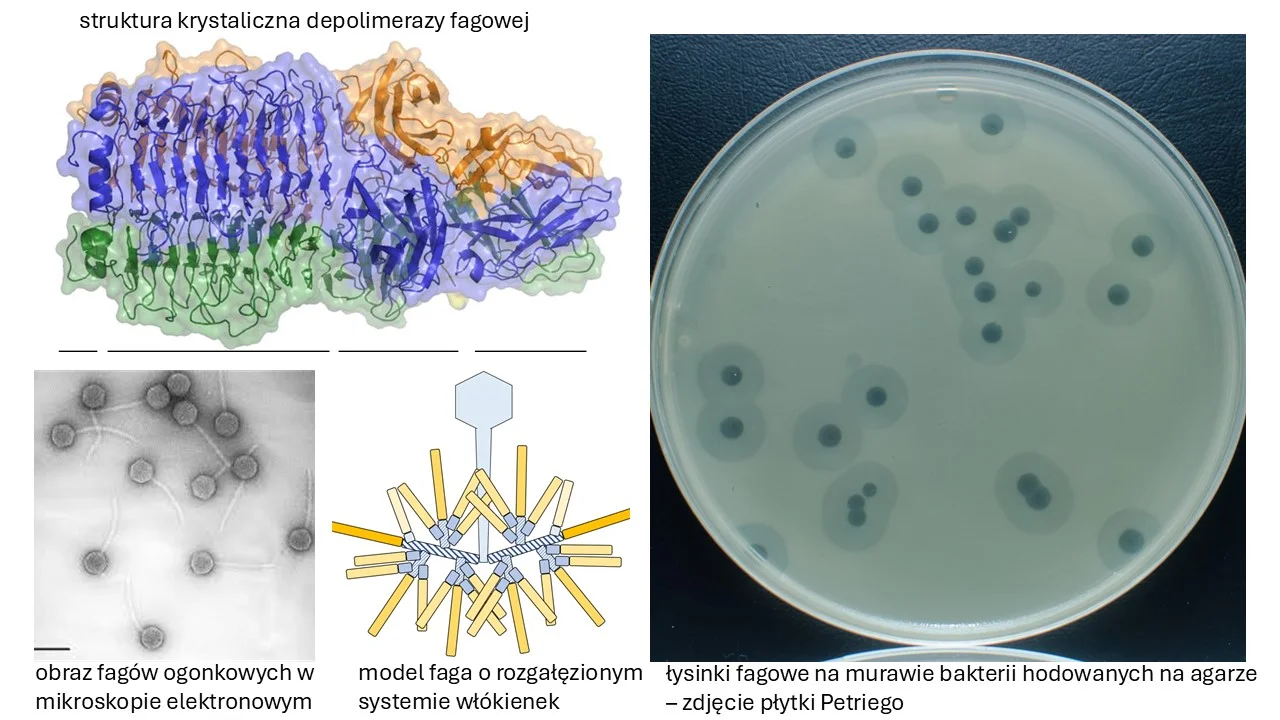
The enemy of my enemy is my friend
Did you know that bacteriophages, which are viruses that attack bacteria, could be the key to fighting antibiotic-resistant strains of bacteria?
This fascinating topic is the focus of research conducted by a team led by professor Zuzanna Drulis-Kawa of the Department of Pathogen Biology and Immunology of the Faculty of Biological Sciences at the University of Wrocław. The work of the professor’s team focuses on innovative methods of using bacteriophages and their enzymes in the fight against bacterial pathogens.
Bacteriophages (bacterial viruses) are the most abundant biological molecules in the world and obligate parasites that multiply in bacterial cells – their hosts. We can distinguish between two types of phages: lytic phages, which kill the bacterium as a result of the multiplication of progeny viruses, and lysogenic phages, which take up residence in the cells of their hosts and multiply their genetic material as the bacterial cell divides. Lysogenic phages often cooperate with the host cell by protecting it from infection by other viruses, or by bringing “gifts” in the form of genes encoding toxins that determine the virulence of bacteria to higher organisms, such as humans.
The main goal of Professor’s team’s research is to isolate, understand the biology of bacteriophages and evaluate their effectiveness against multi-resistant strains of ESKAPE bacteria, such as Klebsiella pneumoniae and Pseudomonas aeruginosa, which are classified by the WHO as critical pathogens, i.e. resistant to all antibiotics available for treatment. Prof. Drulis-Kawa’s research aims to develop new therapies that can replace or support traditional antimicrobial therapies.
The work of prof. Drulis-Kawa’s team has allowed the creation of a clinical bank of multiresistant strains, a bank of lytic phages active against multiresistant bacterial pathogens (K. pneumoniae and P. aeruginosa), and the development of recombinant enzymes that effectively degrade the cell wall and bacterial envelopes. It has been successfully demonstrated that phages and their enzymes can effectively destroy bacterial biofilms, which are particularly difficult to control. They also proved that phage infection can select immune-sensitive bacterial populations and remove antibiotic resistance genes.
Prof. Drulis-Kawa’s team actively participates in many research projects funded by national and international institutions, and collaborates with many research centers around the world, including scientists from Belgium, France, Germany, the UK, Spain, Italy, Israel, Ireland and others. Currently, the Department of Pathogen Biology and Immunology has 5 projects underway in the topic of phages and their enzymes:
- Sonata Bis UMO2020/38/E/NZ8/00432 “Using genomic epidemiology and experimental microbiology to study evolution of bacteriophage host-range” in collaboration with Jagiellonian University.
- JPIAMR2022-003 (2022/04/Y/NZ6/00123) European Commission framework program – the project selected for funding. Title: “Design and implementation of an effective cOmbination of Phages and Antibiotics for improved TheRApy protocols against KLEbsiella pneumoniae”. Acronym KLEOPATRA, in collaboration with 6 foreign partners.
- OPUS-LAP, UMO-2022/47/I/NZ1/01450 “Function, organization, dynamics, and evolution of hyperbranched receptor-binding protein systems in Klebsiella jumbo phages and their interactions with bacteria” in collaboration with UGent University Ghent.
- Project 101168024 – RESILIENCE-R-2023 – EDF-2023-RA-SGA (Topic: EDF-2023-RA-SGA-MCBRN-MCM; Type of action: EDF Research Actions. “First research action for Medical countermeasures performed in the frame of the RESILIENCE FPA consortium”, in a consortium of European partners.
- JPI-AMR 2024, Phage Therapy Antipersister strategy, PHAGES-AntiPERS. UMO-2024/06/Y/NZ6/00172 “Phage Therapy Antipersister Strategy”, in collaboration with 5 foreign partners.
Professor Zuzanna is active in the international arena promoting phage therapies and bacteriophage knowledge. She is currently a member of a subcommittee of the European Committee on Antimicrobial Susceptibility Testing (EUCAST), which aims to set standards for bacteriophage susceptibility testing (PST) for clinical laboratories. She is a founding member and participates in the executive committee of the European Society of Clinical Microbiology and Infectious Diseases, ESCMID Study Group for Non-traditional Antibacterial Therapy. She has served as President-Elect (2021-2022); President (2023-2024); and Trustee At-Large 2025-2027 of the International Society for Viruses of Microbes.
The research and development work carried out by the staff of the Department of Pathogen Biology and Immunology contributes to advances in many fields, including medicine, the pharmaceutical industry, biotechnology and health care. Research results have direct implications for improving public health and developing new treatments. The introduction of phage therapies can reduce the burden on health care systems by allowing people with chronic infections to return to work. However, the use of bacteriophages in medicine comes with legislative challenges, such as drug registration, clinical trials, formulation manufacturing, and legal development of personalized therapies. It is important that these issues are carefully and quickly developed and implemented.
Translated by Małgorzata Twardochleb (student of English Studies at the University of Wrocław) as part of the translation practice.
Complied by: Zuzanna Drulis-Kawa
Date of publication: 21.05.2025.
Added by: E.K.



